COVER- Launched: New businesses leave economic ruins behind
Art of the deal: Schenck puts paintings online
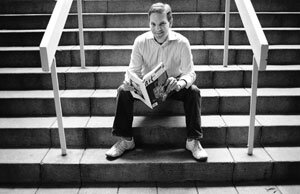
Matt Schenck
JEN FARIELLO
As a vice president of international language learning biz Rosetta Stone, Matt Schenck learned the art of business; now he's aiming for success with an actual art business.
"Buying art can be stressful," says Schenck, 38, who launched the online art venture Art Quiver in April, noting that most people don't have time to scour galleries for the perfect piece, and that even if they did, mingling in a world of berets, paint palettes, and words like "gouache" isn't comfortable for everyone.
"It can be intimidating," he notes.
Not so online, he hopes. "We're using the power of the web in a way that's not being done currently," says Schenck. Visitors to www.artquiver.com are invited to play a series of art rating games, in which they compare various works and rank them according to their preference. Other search options allow would-be buyers to search by medium, colors, style, price, or artists' portfolios. The sales history of the artists' previous works are offered in graph form as well, to assure buyers the price they're paying is reasonable.
"This has the power to change the way people interact with original art," he says.
It's a new world for the artists selected for inclusion on the site as well. Whereas most online art purveyors feature replicas of works by already famous artists, Art Quiver won't be selling Monet, Chagall, or Picasso. Instead, it features names that aren't well known yet, but could be someday.
"The web," says Schenck, "is about national exposure."
The idea for Art Quiver began percolating in Schenck's mind in 2007 after he left Rosetta Stone. He'd risen to the number two position at the language-learning company best known for its "He was a hard-working farm boy. She was an Italian supermodel" ads which helped propel the company from $4 million in sales and a dozen employees in 1998 to a public corporation with $250 million in sales last year and 1,400 employees.
"Matt doesn't just have an entrepreneurial idea; he makes it a reality and proves it," says Rosetta Stone CEO Tom Adams, who also happens to be Schenck's best friend from high school and who credits Schenck's creative marketing with much of Rosetta Stone's success.
Despite the fond feelings, Schenk doesn't regret moving on.
"My heart is in the start-up entrepreneurial phase," Schenck explains.
In summer 2008, after he and his family relocated from Harrisonburg, where Rosetta Stone was founded, to Charlottesville, he incorporated Art Quiver, and over the next six months, he raised capital and hired a "chief techie" responsible for building the most important element of the business: the website.
Less than six months after launching, the company, located in the city-subsidized "technology incubator" office space on the ground level of the Market Street Parking Garage, remains small and consists of Schenck, the webmaster, a graphic designer, a publicity person, and a Richmond artist who selects the artists featured on the site.
The works offered are not cheap–- they range from several hundred to several thousand dollars, with the artist receiving 55 percent of the price– but Schenck says the site's customers are not making a typical online purchase, where bottom dollar wins the day.
"Art is an asset," he says, adding that there's an additional– and unusual– aspect to buying art on the site: a lifetime guarantee that promises to return the original purchase price and pay for return shipping if the buyer ever has a change of heart.
"My job," he explains, "is to take away obstacles people have in buying art online."
About face: Permanent make-up raises eyebrows... literally
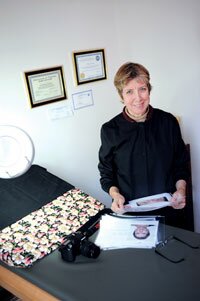
Mary Hunter
JEN FARIELLO
Mention the words "permanent make-up," and unfortunate images of harshly rimmed eyes and lips might come to mind, along with a question: what if you want a different color one day? But Mary Hunter, who opened Eyebrow Renovation and Permanent Make-up on October 22 in the same downtown building as the Hook's offices, says she has no intention of turning her clients into Tammy Faye Bakker lookalikes.
"If it's done right, you can't even tell," says Hunter, 59, who owned a local camera repair shop from 1983 to 1996 and says her experience with precision handheld camera tools helped prepare her to master precision tattooing equipment. Dispelling myths about tattooed make-up is her next challenge.
"This is not about glamour," she says. "It's about having a face you really like."
As women age, hair– eyebrows and eyelashes included– tends to thin. While cosmetic medical procedures including Botox and various facial fillers are common for women looking to turn back the clock, Hunter says restoring face-defining features through tattooing can also improve appearance for about the same price. (A single round of Botox typically runs between $300 and $400, while Hunter's price for eyebrow restoration, for instance, is approximately $325.)
Although the make-up is permanently tatooed, it is done with such fine strokes that even on close examination it's difficult to see. The tattooed eyeliner, for instance, is not a heavy line but is instead eyelash enhancement– subtle color applied right at the base of the lashes that Hunter says diminishes bleary, tired appearance or redness. It does not, she points out on before and after pictures of her clients, remove the need for standard eyeliner or mascara if one is looking for a more "made-up" look– for, say, an evening out.
Similarly, the individual hair-like tattoo strokes she uses in eyebrow restoration are not clown-like arches– they are subtle shading along the brow's natural line.
Hunter's career change– she most recently worked as an editor for a Northern Virginia-based technology journal– followed several harsh blows. Last February, she was laid off, and a month later, she was diagnosed with breast cancer. In May, she underwent a double mastectomy. Through her ordeal, Hunter was introduced to the concept of tattooing, not only to restore eyebrows and lashes lost during chemotherapy, but also as part of restoring the appearance of an aureola– the pigmented nipple area– during breast reconstruction, another service she offers.
"I thought, 'I could do that'," says Hunter, who started training with several aestheticians in town and is now licensed at both the state and national levels.
Six months after her own surgery, Hunter says, the tough times of last spring are memories, and she's excited to be starting a new chapter.
"This," she says with a smile, "makes people happy."
Star power: New Age in a storefront setting
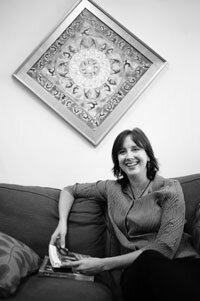
Abby Arnold
JEN FARIELLO
It's only fitting that Abby Arnold consulted an astrologer when planning which day to open her new business, Ananda Community Center for Conscious Living.
"If you're going to do this kind of work, you have to live by it," says Arnold, who took her own astrologer's advice and opened the doors to Ananda on May 5. Three months later, she resigned her post teaching writing at UVA to commit herself full-time to her new wellness business which offers alternative treatments and classes.
And they are, indeed, alternative.
There's "Chakra balancing," based on the ancient Hindu concept that our bodies have seven pathways for processing life energy; "deep healing," which Arnold says uses techniques including "aura clearing;" and Reiki, a type of hands-off massage that also focuses on balancing the energy inside one's body by channeling the "universal life force." There's even Reiki for pets– mostly dogs, cats, and horses– who are sick or otherwise "out of sorts."
While the counties around Charlottesville are dotted with various spirituality and wellness centers from Yogaville in Buckhingham to Synchronicity in Nelson, Charlottesville proper didn't have much beyond the Quest Bookstore for New Age thought until the arrival of Ananda, which is located between the Artful Lodger and the Vinegar Hill Theatre.
Is there enough demand for these types of treatments in a storefront setting? Arnold admits she meets many skeptics– and she doesn't mind their doubting the authenticity of her offerings.
"I teach critical thinking at the university," she says. "I believe in skepticism in a nebulous area like this where results are verified by how you feel. Often, people come because they're in pain, or searching for something. It's easy to be tricked."
While most of the services she offers haven't been subjected to serious, peer-reviewed scientific research– and some studies suggest the veracity of psychic readings has actually been disproven– Arnold says her own experience is her guide, as she personally tests all treatments and services before offering them at Ananda. For instance, her chosen Richmond-based psychic "gives the best readings I've ever experienced," she says, noting that she fired another one for giving vague readings.
"If what they're saying could apply to anyone," she says, "you're not getting a real reading."
Arnold herself gets high marks for her skill as a Reiki practitioner.
"She is, by far, one of the best," says Cheryl Hopkins, who in addition to being one of Arnold's clients is the astrologer who helped Arnold select her opening day. During a Reiki treatment, Hopkins says, she may feel a cool or warm sensation as Arnold's hands pass over her. "Ninety-eight or 99 percent of the time," she says, "you'll go into a deep state of relaxation."
In addition to the treatments and services for humans and animals– which average $65 per hour– Ananda offers free lunchtime meditation sessions. Arnold says those who become members of the center for a fee ranging from $75 to a one-time donation of $5,000 will receive perks including a 1o percent discount on treatments and "free deluxe tea" any time the Center is open.
Despite no takers just yet on the $5,000 deal and despite launching her business in a tough economy, Arnold says she trusts that the stars wouldn't lead her astray.
"People need to find their own paths and what works for them at any given time," she says, "and that's what I want to help people do."
WHERE ARE THEY NOW?
Good times stop, then roll again for Rowdy

Mary Hunter
JEN FARIELLO
When a group of friends launched Nascar news biz Rowdy early in the 21st Century, they couldn't have predicted the economic downturn. It turns out they were in for a wild ride.
"This time last year, when the economy was going crazy, we had our major funder pull all funding from us," explains one of Rowdy's three founders, Tyler Sewell. "We were broke."
Rowdy started as a service for Cingular cellphone users who could sign up for the Rowdy show– Nascar-themed skits featuring Sewell and one of his biz partners Tom Van der Voort as their alter egos, "Buck Fever" and "Bass Masters" (the company's third founder, Rusty Speidel, works behind the scenes).
But if the shows are funny, there was nothing amusing about the bleak future the company– which had added two employees– appeared to be facing last year.
"The five of us worked for free for about three months doing everything we could do to save our show," says Sewell, noting that by last year the shows were available on the website, radio programs, and podcasts.
Just before they turned the Rowdy engine off for good, however, they hooked up with Nascar publishing company American City Business Journal, which puts out a Nascar-themed magazine and newspaper and runs scenedaily.com, a Nascar website.
"I said, please come buy our company and save the day," Sewell recalls. To his and his partners' delight, the answer was yes.
Now a member of American City Business Journal family, Sewell says, Rowdy will be relaunching its website in January, is planning to do a syndicated radio show, and is pushing more video content online.
And while they're no longer their own bosses, Sewell says he and his partners are happy to be back on track.
"There's no real difference except we have solid backer and a business model that will definitely generate revenue."
Sounds like a winning combination.
Folded, not folding! Music biz keeps the beat, branches out
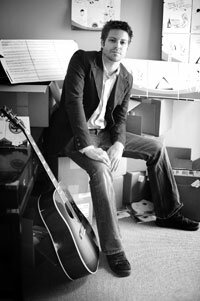
John Keefe
FILE PHOTO BY JEN FARIELLO
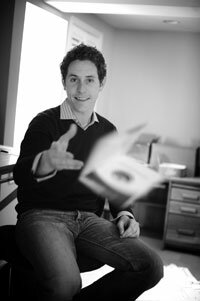
Eric Braun
FILE PHOTO BY JEN FARIELLO
When John Keefe and Eric Braun launched their Shredhed product in 2008, the response from the music industry was immediate– and positive. The product– a laminated 2'X3' sheet of music that can be hung on the wall, folded into a triangular self-supporting music stand, or collapsed into a "trapper-keeper" style folder– won Best in Show at the National Association of Music Merchants Show in 2008, and had big name bands including the Black Crowes and R.E.M. signing up to allow the sheet music of their tunes to be packaged in Shredhed's user-friendly and info-packed format.
In the last year, says Keefe, there have been other successes for his and Braun's company, Inktree Inc.– Shredhed is now in major retail stores including Target, BestBuy, Barnes & Noble, and Guitar Center.
But finding other companies willing to invest in packaging their non-music related products in a new way has proven difficult in the toughest economic climate since the Depression.
Keefe says Carson-Dellarosa Publishing has adapted the Shredhed concept to a series of educational games called "2 Big Games," sold in educational supply stores, and a "green" direct mail media carrier, essentially a smaller version of the Shredhed folder, is being used in various corporate advertising campaigns.
The biggest news of all, however, is a deal Braun and Keefe recently inked to create an instructional supplement for what Keefe calls "one of the most anticipated video games of 2009." Alas, Keefe says, he's contractually prohibited from revealing which game until its release in mid-November– but he believes the deal bodes well not just for his and Braun's company but for businesses in general.
"It's an example of people coming out of their bomb shelters after the economic meltdown," says Keefe, who believes the potential for their patented product remains great in untapped areas like cooking and medicine– and that once companies see how the concept can be applied using their content, they understand the benefit.
"It's great for anything," he says, "that requires the use of two hands."
Cleaning up: Soap hopes still soaring
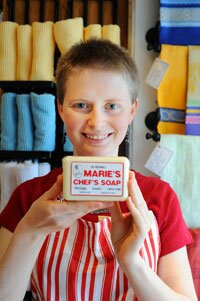
Marie Skylark
FILE PHOTO BY JEN FARIELLO
It started as a hunt to replace a bar of soap her boyfriend brought home from France in 2005. But when Marie Skylark– then a first-year biochemistry major at UVA– discovered no company in America made chef's soap, she didn't give up; she headed straight for her laboratory and created her own. Since the Hook's first article on Skylark, the young entrepreneur (age 22) says her soap business– Marie's Chef's Soap– has been, well, cleaning up.
By last spring, her product was available in several local stores– The Happy Cook in Barracks Road and Whole Foods on Seminole Trail– and in the last six months, she's added several others including Fluvanna Hardware, Mona Lisa Pasta, and Foods of All Nations.
"Our product has been absolutely successful in Charlottesville," said Skylark, who believes its origination in the community piqued most of local consumers' interest. "I think for people in Charlottesville, especially as they're becoming more health conscious, they're reaching out to the product more and more."
Now Skylark hopes the whole country will soon be awash in her bars, which retail for $28.95 and contain no animal products, synthetics, or fragrances– appealing to chefs who'd rather their culinary creations not taste soapy. Another perk: each bar should last for a whole year.
In addition to selling the product on amazon.com– a "great success," she says– she's working through the lengthy approval process to secure a January feature on QVC, the largest televised home shopping network in the country. She is also hoping to secure features with Williams-Sonoma, Anthropologie, and Kitchen Collection.
"We've really started to get some national exposure," she says, "and I think people are finally starting to see the uniqueness of the product."– Erika Maguire
#